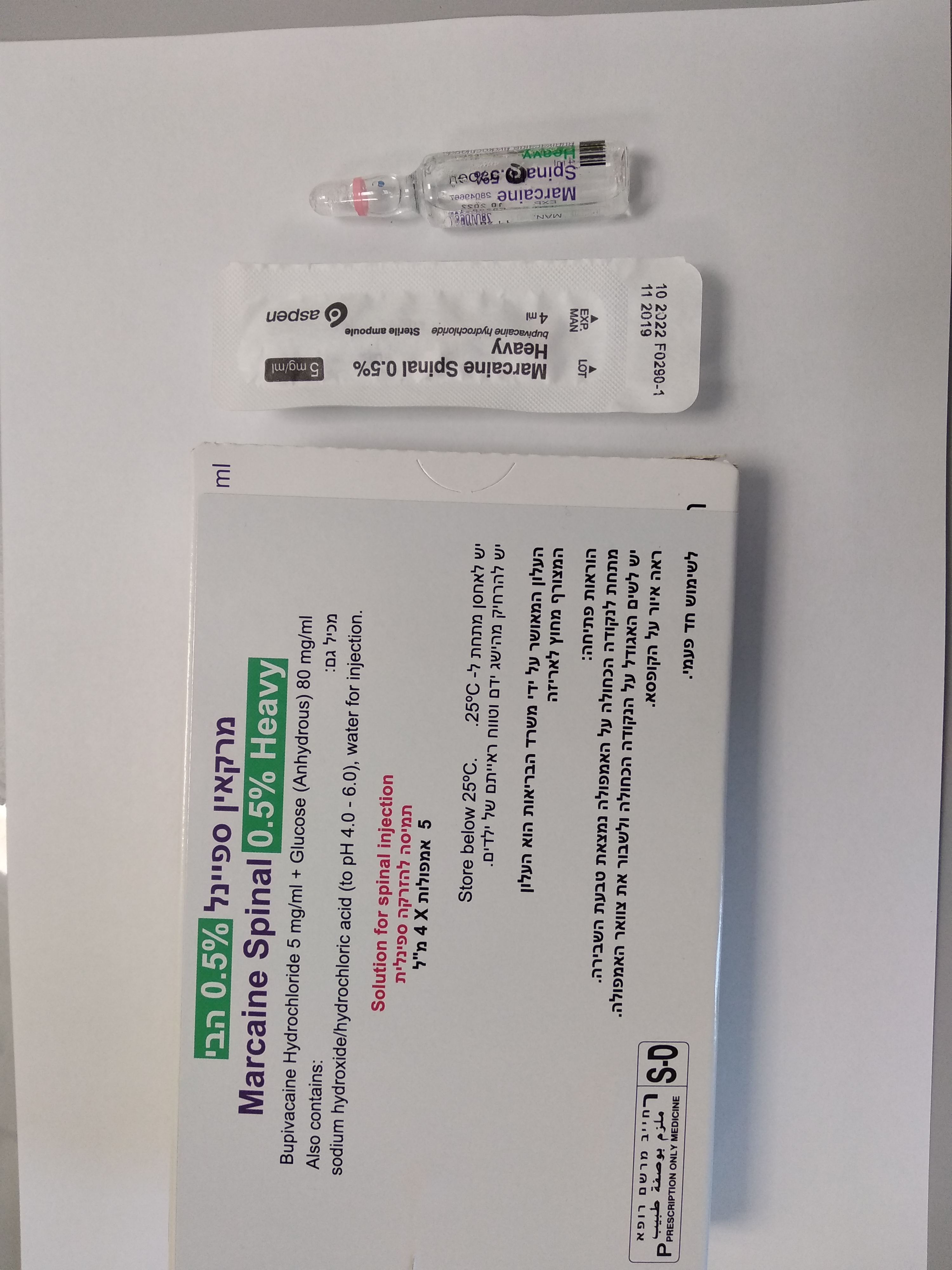Quest for the right Drug

מרקאין ספיינל % 0.5 הבי MARCAINE SPINAL 0.5 % HEAVY (BUPIVACAINE HYDROCHLORIDE, GLUCOSE)
תרופה במרשם
תרופה בסל
נרקוטיקה
ציטוטוקסיקה
צורת מתן:
שדרתי : SPINAL
צורת מינון:
תמיסה להזרקה : SOLUTION FOR INJECTION
עלון לרופא
מינוניםPosology התוויות
Indications תופעות לוואי
Adverse reactions התוויות נגד
Contraindications אינטראקציות
Interactions מינון יתר
Overdose הריון/הנקה
Pregnancy & Lactation אוכלוסיות מיוחדות
Special populations תכונות פרמקולוגיות
Pharmacological properties מידע רוקחי
Pharmaceutical particulars אזהרת שימוש
Special Warning עלון לרופא
Physicians Leaflet
Special Warning : אזהרת שימוש
4.4. Special warnings and precautions for use It should be noted that spinal anaesthesia can sometimes cause major blockades involving paralysis of the intercostal muscles and diaphragm, particularly in pregnant women. Caution should be observed in patients with AV block II or III, as local anaesthetics may decrease myocardial transmittance. The elderly and patients with severe hepatic disease, severe renal impairment or poor general health also require particular attention. Patients treated with antiarrhythmic class III agents (e.g. amiodarone) should be monitored closely and ECG monitoring should be considered as the cardiac effects of bupivacaine and class III antiarrhythmics may be additive. Intrathecal anaesthesia can lead to hypotension and bradycardia. The risk of such effects can be reduced by e.g. injection of a vasopressor. Hypotension should be treated immediately with administration of an intravenous sympathomimetic, and repeated if required. Like all local anaesthetics, bupivacaine may cause acute toxic effects in the central nervous and cardiovascular systems if use results in high blood concentrations. This applies particularly after inadvertent intravascular administration or administration to highly vascularised areas. Ventricular arrhythmia, ventricular fibrillation, sudden cardiovascular collapse and death have been reported in connection with high systemic concentrations of bupivacaine. However, high systemic concentrations are unusual at the doses normally used for spinal anaesthesia. An uncommon but serious undesirable effect of spinal anaesthesia is widespread or total spinal blockade resulting in cardiovascular and respiratory depression. The cardiovascular depression is caused by extensive sympathetic blockade which may result in hypotension and bradycardia, or even cardiac arrest. Respiratory depression can be caused by blockade of the nerve supply to the respiratory muscles, including the diaphragm. There is an increased risk of widespread or total spinal blockade in elderly patients and patients in the late stages of pregnancy. The dose should therefore be reduced for these patients. In rare cases, spinal anaesthesia may cause neurological damage, resulting in paresthesia, anaesthesia, motor weakness and paralysis. It is not believed that neurological conditions such as multiple sclerosis, hemiplegia, paraplegia and neuromuscular disturbances are negatively affected by spinal anaesthesia, but caution should be observed. This medicine contains less than 1 mmol (23 mg) of sodium per millilitre, i.e. it is almost “sodium free”.
Effects on Driving
4.7 Effects on ability to drive and use machines Depending on the dose and method of administration, bupivacaine may have a transient effect on mobility and coordination.

שימוש לפי פנקס קופ''ח כללית 1994
לא צוין
תאריך הכללה מקורי בסל
01/01/1995
הגבלות
תרופה שאושרה לשימוש כללי בקופ'ח
מידע נוסף
